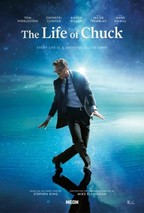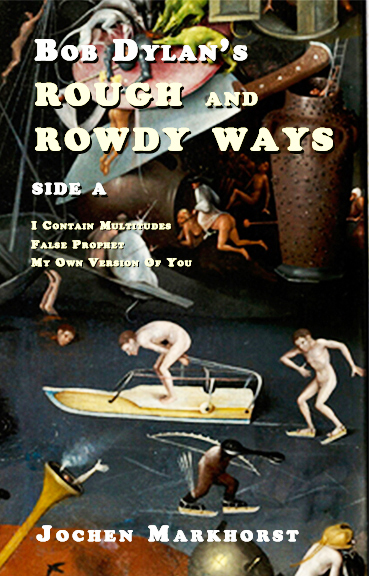by Jochen Markhorst
V You Can’t Judge A Book By The Cover
Well, she don't make me nervous, she don't talk too much She walks like Bo Diddley and she don't need no crutch She keeps this four-ten all loaded with lead Well, if I go down dyin', you know she's bound to put a blanket on my bed, c'mon
 “Longevity and quality. Most people in pop music are like moths around a bug light; they circle for a while and then there’s a bright flash and they’re gone. Not Dylan” (Stephen King in Rolling Stone, 7 December 2016). We all know by now that Stephen King is a huge Dylan fan. His books are littered with references and quotes, “Desolation Row” is his Desert Island Discs pick (“The one disc I would save”), and in 2016 he was one of the first to applaud Dylan’s Nobel Prize award. In, as usual, highly quotable, affectionate terms. As in his childhood memory of the first time he heard Dylan:
“Longevity and quality. Most people in pop music are like moths around a bug light; they circle for a while and then there’s a bright flash and they’re gone. Not Dylan” (Stephen King in Rolling Stone, 7 December 2016). We all know by now that Stephen King is a huge Dylan fan. His books are littered with references and quotes, “Desolation Row” is his Desert Island Discs pick (“The one disc I would save”), and in 2016 he was one of the first to applaud Dylan’s Nobel Prize award. In, as usual, highly quotable, affectionate terms. As in his childhood memory of the first time he heard Dylan:
“I must have been 14 the first time I heard Bob Dylan. I was sitting in the back of a car going home from a movie. This is in rural Maine back when AM radio was big. There was a guy on WBZ radio out of Boston and he had a show called The Night Express and played a lot of off-the-wall stuff. He played “Subterranean Homesick Blues”. Hearing it was like being electrified. It was like this pressurised dump of lyrics and images.”
There are more than twenty King books and essays in which a Dylan song appears, some with more relevance than others. And in the twenty-first century, we seem to see the next step in King’s Dylan admiration: their work seems to intertwine. In April 2020, King’s collection If It Bleeds, a collection of four unpublished novellas, is published. The second is the little masterpiece “The Life Of Chuck”, which will be beautifully adapted for film in 2024 by Mike Flanagan (with Tom Hiddleston as Chuck and Mark Hamill as the young Chuck’s grandfather). The leitmotif of the film and the novella is Walt Whitman’s “Song of Myself”, and more specifically the “I contain multitudes” passage (also the title of Act One, the last chapter of the reverse chronologically told story). And at the very end of the film, and on the last page of the novella, we understand that I contain multitudes is even more than just a leitmotif – it provides the plot.
The collection of short stories hits shops on 21 April 2020. Four days earlier, on 17 April, Dylan’s “I Contain Multitudes” is released, the second single in the run-up to the release of Rough And Rowdy Ways. The confluence of King’s novella and Dylan’s single suggests that both masters during the same period were inspired by the same poem fragment to create a masterpiece– if it is not a mere coincidence, then it is at least serendipity. Demonstrating, as well, that great minds think alike.
Partly thanks to a shared cultural background, of course. Dylan and King are contemporaries (King was born in 1947, Dylan in 1941), both hail from the far north of the United States (Dylan from Minnesota, King from Maine), both are cinephiles, and both are blessed with a healthy music obsession. Sharing similar musical tastes, as is often evident from King’s atmospheric descriptions and metaphors.
“There she sat with her rust-flecked sides and her new hood and her tailfins that seemed a thousand miles long. A dinosaur from the dark ditty-bop days of the 50s when all the oil millionaires were from Texas and the Yankee dollar was kicking the shit out of the Japanese yen instead of the other way around. Back in the days when Carl Perkins was singing about pink pedal pushers and Johnny Horton was singing about dancing all night on a honky-tonk hardwood floor.”
… from the horror novel Christine (1983), which received rather mixed reviews. However, critics did admire the authenticity of the 1950s atmosphere it evoked. As Christopher Lehmann-Haupt wrote in the New York Times:
“In short, the very atmosphere of the book evokes memories of chopped hot-rods roaring into the parking lots of late-night pizza joints, their radios blasting Chuck Berry, Bo Diddley and the Big Bopper. From here it is not such a leap to Christine, with ‘her grille shaking like an open mouth full of chrome teeth, her headlights glaring’.”
The reviewer’s radar is finely tuned; Bo Diddley is just as deeply ingrained in King’s work as he is in Dylan’s, and, as with Dylan, he sometimes pops up explicitly. In the blood-curdling, semi-autobiographical thriller Misery (1987), we read in the beginning, in chapter 6:
“The goddam tunnel made him nervous. He had been playing an old Bo Diddley tape on the cassette machine under the dash and never turned on the radio until the Camaro started to seriously slip and slide and he began to realize that this wasn’t just a passing upcountry flurry but the real thing.”
And even more explicitly when King is asked in 1998 to contribute to the amusing, surprisingly entertaining compilation album Stranger than Fiction. The double album is an offshoot of the illustrious Rock Bottom Remainders, the charity band consisting of various writers, critics and a few real musicians (such as Al Kooper and Roger McGuinn, and even Bruce Springsteen joins in once). Amateur guitarist King belongs to the hard core of the cheerful, not very serious supergroup, which performed between 1992 and 2012. We “continue to play now and then, sometimes as The Remainders, sometimes as Raymond Burr’s Legs,” as King says in his sort-of-autobiography On Writing (2000).
The 1998 double album sails under the one-off pseudonym The Wrockers (a contraction of writers and rockers) and is a hodgepodge of more or less dusty blues songs such as T-Bone Walker’s “Alimony Blues” (performed by Norman Mailer) and Muddy Waters’ “I’m Your Hoochie Coochie Man”, evergreens like “Man Smart, Woman Smarter”, “Wild Thing” and “Hit the Road Jack”, and novelty songs such as “Act Naturally”, “Right Said Fred” and “Rainy Day Bookstores” (Ben Fong-Torres’ parody of “Rainy Day Women No. 12 & 35”). Thirty-two songs. Stephen King is alpha and omega. Together with Warren Zevon, he closes Disc 1 with “Stand By Me”, but moreover: he opens the party with Bo Diddley’s “Bo Diddley”, and he closes the ball with Bo Diddley’s “You Can’t Judge A Book By The Cover”, the song that Dylan himself also tries out during the Down In The Groove sessions in 1987.
A Dylan song, King does not perform. But then again, he pays sufficient homage to Dylan’s songs in his essays, interviews and books. In From A Buick 8, for example, his second horror novel about a car, set once again in Western Pennsylvania, following Christine:
“Sandy flipped on the light switches by the door and in the glare of the naked bulbs the Buick stood like one prop left on a bare stage, or the single piece of art in a gallery that had been dressed like a garage for the showing. What would you call such a thing? Sandy wondered. From a Buick 8 was what occurred to him, probably because there was a Bob Dylan song with a similar title. The chorus was in his head as they stood there, seeming to illuminate that feeling of dread: Well, if I go down dyin’, you know she bound to put a blanket on my bed.”
To be continued. Next up From A Buick 6 part 6: Boy, this is love
Jochen is a regular reviewer of Dylan’s work on Untold. His books, in English, Dutch and German, are available via Amazon both in paperback and on Kindle: 
- Blood on the Tracks: Dylan’s Masterpiece in Blue
- Blonde On Blonde: Bob Dylan’s mercurial masterpiece
- Where Are You Tonight? Bob Dylan’s hushed-up classic from 1978
- Desolation Row: Bob Dylan’s poetic letter from 1965
- Basement Tapes: Bob Dylan’s Summer of 1967
- Mississippi: Bob Dylan’s midlife masterpiece
- Bob Dylan’s Greatest Hits
- John Wesley Harding: Bob Dylan meets Kafka in Nashville
- Tombstone Blues b/w Jet Pilot: Dylan’s lookin’ for the fuse
- Street-Legal: Bob Dylan’s unpolished gem from 1978
- Bringing It All Back Home: Bob Dylan’s 2nd Big Bang
- Time Out Of Mind: The Rising of an Old Master
- Crossing The Rubicon: Dylan’s latter-day classic
- Nashville Skyline: Bob Dylan’s other type of music
- Nick Drake’s River Man: A very British Masterpiece
- I Contain Multitudes: Bob Dylan’s Account of the Long Strange Trip
- Bob Dylan’s Rough And Rowdy Ways – Side B
- Bob Dylan’s High Water (for Charley Patton)
- Bob Dylan’s 1971
- Like A Rolling Stone b/w Gates Of Eden: Bob Dylan kicks open the door
- It Takes A Lot To Laugh, It Takes A Train To Cry b/w Just Like Tom Thumb’s Blues – Bob Dylan’s melancholy blues
- Bob Dylan’s Rough And Rowdy Ways – Side A
